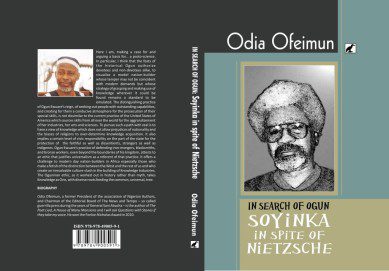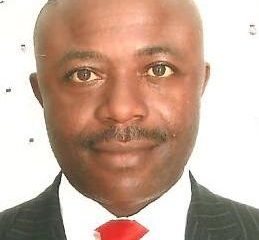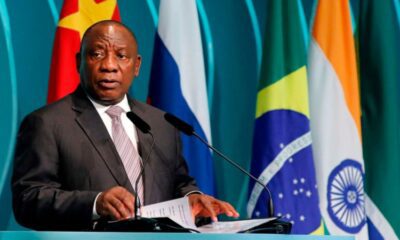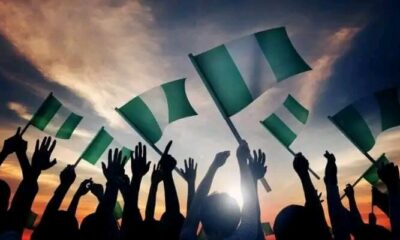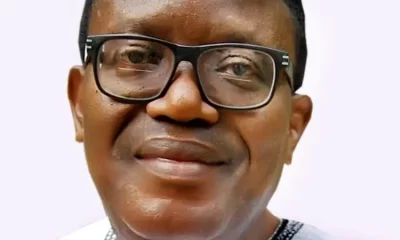National Issues
Soyinka In Context -By Odia Ofeimun
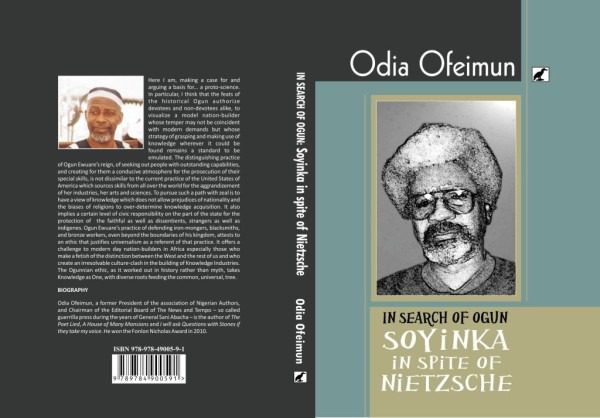
Soyinka’s culture-heroism may be derived from the mythical heights he has attained within the culture-clash syndrome that makes proficiency in the language a mastering of the coloniser. No question about it: as one of the pioneers in the emergence of modern African literature, he can take his rightful place among those who have written Africa into history. He has earned his feathers by deflating the flatulent racism that described Africa as a Heart of Darkness because the written text had no dominion in African affairs.
What I want to emphasise in this segment is the divide between Soyinka’s and Awolowo’s performances on the one hand and, on the other, the undemocratic regimes, regimes of impunity which have sought to break their resistance and the popular acclaim attached to their feats on behalf of the larger society. It may well be noted that, regime to regime – the most successful so far being Olusegun Obasanjo’s in the Fourth Republic – has sought to break down the basis of the successful resistance to tyranny that has sustained Awolowo’s politics and provided the context within which Soyinka’s moral opposition has been actualised. This is talking not just about the ban on political parties which, in the past, merely pushed political organisation underground. It has to be viewed in the context of the political dislocation and take-over of the Yoruba ‘West’, the geo-political headquarters of progressive politics in Nigeria, through election rigging and graft based on open refusal by ruling parties to acknowledge the actual results of elections while announcing the victory of the losers.
It was to ensure the announcement of the actual results of one such election in Western Region that Soyinka, disguised as a gangster with a gun, seized the studio of the Western Nigerian Broadcasting Corporation in 1965 to ‘kill’ a pre-recorded tape of the Premier’s broadcast and to insert his own tape rejecting the Premier and his Party. Unless one underrates the propaganda of deeds that it constituted, such an operation, as a resistance strategy, appears daring but too easy. It may be adjudged as an individual tantrum, essentially ineffectual until one recalls that it all ended with the wetie uprising in the face of the culture of snide policy-making at the Federal level which soon declared a state of emergency in the Western Region. Followed by the imposition of the rule of the parliamentary minority upon the parliamentary majority, the situation involved the Federal Government’s take over of the judiciary to upstage and squelch constitutional redress by the victims. Not only in that crisis but beyond it, the over-weaning nature of the Federal Might was seen as so overbearing that it called for a more concerted response than either individual voluntarism or mere communal revolt. But how else deal with a self-reproducing behemoth of rude power, which ensured that both Awolowo and Soyinka, at different times, went to jail not for what they had done, but what they were supposed to be planning to do?
In Awolowo’s case, the dreams he had of becoming a Prime Minister as recorded in his diary, Flashes of Inspiration, and interpreted by him, were given judicial notice in court and used as the main proof of his wish to seize power through a coup de tat. In Soyinka’s case, journeys across battle lines in his bid to stop a fratricidal civil war were seen by Yakubu Gowon’s Federal Military Government as proof that he was on the other side or planning to wage war on his country. Such tactics of containment, which the minders of Federal Might have deployed against the opposition have ramified into the active sourcing of false statistics to prove the failure of programmes such as free education and free health schemes that the opposition in the Western Region carried out to the benefit of millions. To destroy the credibility of the opposition – and the reason why Regional autonomies in the Federation were thereafter never allowed to have constitutional force – everything had to be done to muddy the waters against them. Thereafter, the people who were the beneficiaries of the good deeds of the opposition, in the era when regional autonomies still provided protection, were simply obliged to see Federal Power as merely disruptive.
Even those who separate his political activism from his literary production tend to deploy his literary prowess, the acclaim he has received in the area of the literary, the many prizes he has won, including the Nobel Prize, as political weapons. I dare say in this regard that what Biodun Jeyifo has called Soyinka’s igilanko geesi, his high-culture attributes as a writer of virtual mandarin poetry and prose have been conjoined in public imagination with his avant garde interventions in the political space to give him the status of a culture hero.
Talking of the disruptiveness of Federal Power, especially against policies and projects which show the ingenuity of Awolowo’s followers, the easy example may be found in the surgical demolition of the ‘free books’ policy in Lagos schools and the spiking of L.K. Jakande’s metroline scheme in Lagos after the military took control of the government in 1983. Two decades later, the Federal government under Olusegun Obasanjo has opted for a strategy of negative, destructive engagements by disallowing road repairs and withholding Federal revenue allocation to local councils created by the government of Lagos state. A brazen determination to punish the people of Lagos state for voting for an Opposition AD Government. In the circumstance, it is not surprising that opposition to successive Federal Governments have become a common theme in both Awolowo’s and Soyinka’s embroilment in the political space. Theirs have been a platform for the defense of fundamental human rights in opposition to the jailing and murder of political opponents, imprisonment without trial of journalists and human rights activists, and the denial of social amenities to constituencies that are known for resisting political abuses.
In terms of the individual acclaim or hero-worship, that Soyinka, in particular, has attracted in the process, be it noted that they are linked in public consciousness with certain enduring performances in his career. One of such performances is his founding of the Pyrates Confraternity, a campus club at the nascent University of Ibadan in the late forties. As it turned out, the Pyrates led the way for the founding of many fraternities that were latterly hijacked by military regimes, prostituted, and turned into violent anarchic satraps for destroying student unionism on Nigerian campuses. Soyinka, disgusted by what has been made of his benign “invention”, simply endorsed the movement of the Pyrates out of the campuses to free it from the entanglement with the debased fraternities. At the same time, he has been demanding that the destruction of the University System by insensitive governments should be corrected by closing them down in order to allow for a proper re-engineering of the University idea in Nigeria.
Incidentally, such radical proposals are linked in popular imagination with his consistent opposition to dictatorship, and his pro-active support for popular freedoms which has led to his having to live in exile. His latest exile, not quite ended, featured his helping to set up the pirate Radio Kudirat, named after the murdered wife of the winner of the annulled Presidential election of 1993, to campaign against General Sani Abacha’s tyranny. The radio station, although not able to have the kind of impact that local media had, was a sensational insertion in the virtual guerrilla war waged against the regime until the “divine intervention” that took the dark goggled one out of circulation for good. Thus, Soyinka, celebrated for standing up to military regimes, speaking up when silence is being officially imposed, writing even when risk is very eminently present, or staying in the lead of demonstrations to protest one misdeed of the government or the other, has had the image of a political activist as much as that of a creative writer. The dominance of his position has tended to make the word, ‘writer’, synonymous with ‘political activist’ in the imagination of not only security and immigration officers trained to seize the passports of extremists, but the general populace.
…his perceived mastery of the English language, even beyond the comprehension of the colonial master, becomes in popular imagination a weapon in the struggle against imperialism rather than a mark of his having sold out to the West as one brand of Afrocentrism would have it.
Even those who separate his political activism from his literary production tend to deploy his literary prowess, the acclaim he has received in the area of the literary, the many prizes he has won, including the Nobel Prize, as political weapons. I dare say in this regard that what Biodun Jeyifo has called Soyinka’s igilanko geesi, his high-culture attributes as a writer of virtual mandarin poetry and prose have been conjoined in public imagination with his avant garde interventions in the political space to give him the status of a culture hero. In a still largely non-literate society, where the popularity and status-conferring power of literacy may be judged by its facilitation of movement through the colonial system, Soyinka’s igilanko geesi, his perceived mastery of the English language, even beyond the comprehension of the colonial master, becomes in popular imagination a weapon in the struggle against imperialism rather than a mark of his having sold out to the West as one brand of Afrocentrism would have it. By domesticating the English language, arguably a prime weapon with which we were once colonised, he has turned a disability into a means of fighting off the very coloniser along lines of his own choosing as a native.
In essence, Soyinka’s culture-heroism may be derived from the mythical heights he has attained within the culture-clash syndrome that makes proficiency in the language a mastering of the coloniser. No question about it: as one of the pioneers in the emergence of modern African literature, he can take his rightful place among those who have written Africa into history. He has earned his feathers by deflating the flatulent racism that described Africa as a Heart of Darkness because the written text had no dominion in African affairs. This particular ground for lionising the dramatist is however one that runs against the reality which shows that most of those who celebrate Soyinka for his literary prowess do so in the manner of the illiterate labourer in the folklore of the old Nigerian Railway Corporation who declaimed a great appreciation of Nnamdi Azikiwe’s nationalism and politics of Big Grammar while reading the West African Pilot unpside down. The culture hero, the man who has done extraordinary and controversial things, as reported by the newspapers or carried by word of mouth, is to this extent to be viewed from the standpoint of a certain underdevelopedness that is part of what culture-heroism is proof of, the popular imagination of a particular type of society.
I would like to illustrate this underdevelopedness at the heart of culture heroism in such a society by making a not-so spurious comparison between it and the culture hero in other, not necessarily more literate, societies by retailing an experience which I had in Caracas capital of Venezuela in December 2002.
…Wole Soyinka, our own Nobel Prize winner was writing his own autobiography at that time. When it got published, would taxi drivers in Lagos and Ibadan buy the book in the way my taxi driver had bought the Marquez biography in Caracas? It made me consider that there is a difference, a quality of difference in the way culture heroes are treated from one culture to the other.
I had travelled there to talk literature and read poetry. Unfortunately, there was a petrol strike there in the way we had it in Abacha’s Nigeria during the Soyinka Festival in 1994. My minders had to detail a taxi driver, something like our own kabukabu, to take care of me for the duration of my stay. Throughout, that taxi driver had a new book, a tome of about 400 pages beside him and between us all the while he was driving. It was the autobiography of Gabriel Garcia Marquez, foremost writer of neighbouring Colombia who was awarded the Nobel Prize for Literature in 1982. Of course, the publication of the book was a big deal in Venezuela and across Spanish speaking Latin America. It turned out that the book was every where, in bookshops. At this particular bookshop in Chocaito, which was more like a bookshop than anything around us in Nigeria, the book was piled high in tantalising architectures to seduce prospective buyers. It was said in some apocryphal urban-speak that the author had refused for the book to be translated into English until his own people had read the book. He wanted to give some kind of advantage to his Spanish readers over his audience in the United States which normally snapped up his books. The Spanish readers of Latin America became superior persons, aristocrats, in the reception of their most famous author. Even taxi drivers, as I could see, were involved.
The first thing that occurred to me was that Wole Soyinka, our own Nobel Prize winner was writing his own autobiography at that time. When it got published, would taxi drivers in Lagos and Ibadan buy the book in the way my taxi driver had bought the Marquez biography in Caracas? It made me consider that there is a difference, a quality of difference in the way culture heroes are treated from one culture to the other. I could not see the Caracan situation happening in Nigeria because the Nigerian situation that produced Soyinka had regressed beyond the circumstance that existed in the country twenty years before he won the Nobel Prize for Literature. For that matter, one could have said in the sixties that the most vibrant indigenous culture in Africa was Yoruba culture. The authors in the language were vibrant, Faleti, Akinwumi Isola, Okedeji, Odunjo. The journal Odu was a vanguard of the culture. And there were publishing houses like Onibonoje Press which, as part of its vested interests, sponsored a conference in the seventies on “the indigenous for national reconstruction”. It was a time of great dreams, great ebullience. If you mentioned Odunjo and Fagunwa, you were like an aristocrat of the business of reading Yoruba literature. Scholars were beginning to write their PhD thesis in the Yoruba language. Then something happened. The Structural Adjustment came and the economy went aground.
All the social, constitutional and bureaucratic forms that had held anomy at bay for so long were ditched. The literature went into doldrums if not exactly into pieces. The authors who wrote those books that got people hankering for more and more were almost dead and dying of hunger until the video films came virtually to save them from penury. It has been that bad. The publishing houses that were rising to devote their mite to the development of that literature have all since collapsed. The critics who were beginning to write criticisms in Yoruba, many of them have become born again Christians and born again Moslems or global villagers who talk about the indigenous cultures now as something to do with mere fetish, lost in subalternity. The audience that was growing has retreated.
Imagine the fate of other Nigerian languages without the headstart that Yoruba has had. And, recall that it took the Odenigbo lectures for Chinua Achebe in the year 1999 to try to re-conscientise our Igbo speakers to return to proper nature. The truth is that we live in a society where some are fighting hard, for religious reasons, to remove their own names from the indigenous languages in order to make the angels in heaven happy at their abandonment of ancestral motifs.
The real source of the crisis was proved again recently after the dramatist Wale Ogunyemi, before his exit, published his translation of Chinua Achebe’s Things Fall Apart into Yoruba with title, Igbesi Aye Okonkwo You would have thought this was a major event in the life of Yoruba and Nigerian literature. Just as it would be a major event if Tahir Ibrahim’s The last Imam or Soyinka’s Ake was translated into Igbo, Hausa, Edo or Ijaw. But for a culture that long left the lane where it could participate in its own culture, it was a mere revelation of tragedy. Imagine the fate of other Nigerian languages without the headstart that Yoruba has had. And, recall that it took the Odenigbo lectures for Chinua Achebe in the year 1999 to try to re-conscientise our Igbo speakers to return to proper nature. The truth is that we live in a society where some are fighting hard, for religious reasons, to remove their own names from the indigenous languages in order to make the angels in heaven happy at their abandonment of ancestral motifs. The pity is that when they go on pilgrimage to Isreal and Saudi Arabia, they fail to see how the pre-Christian and pre-Islamic cultures of those people have been accommodated and sanctified within the religious code.
…this is a country in which the indigenous languages are not doing so well in terms of being in proper conversation with other languages of the world.
To get to the tragic bottom of the matter, one needs only to set the problem of the more indigenous language side by side with the challenges in the English language. The latter, more widely spoken, between all the nationalities, than any indigenous Nigerian language, is a tell-tale of crisis. Nigerians may speak or write English poorly ostensibly because, as some still manage to say of the nation’s official language, it is an alien tongue. But this is a country in which the indigenous languages are not doing so well in terms of being in proper conversation with other languages of the world. What leeway have people who may be going dumb in the official language but really cannot take refuge in indigenous languages that are pariahs in the global cultural economy? And to think that this is happening in a country where Obafemi Awolowo’s and his Egbe Omo Oduduwa once thought that the knowledge in the English language could be transferred into the indigenous language, and vice versa. It tells of a self-forgetting that has overcome a people whose self-motivation was once a national platform rather than something of the nature of a tragedy.
Excerpted from Odia Ofeimun’s In Search of Ogun: Soyinka In Spite of Nietzsche, published by Hornbill House of the Arts, Lagos 2014, 206 pages.)

